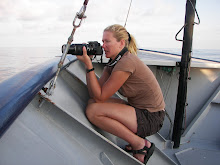Subscribe to:
Post Comments (Atom)
.jpg)
Blog Archive
Nathaniel B. Palmer


On My Way to the Bottom of the World...
From January 4 through February 24, 2008, I will be participating in a research cruise in the Ross Sea, Antarctica. The cruise which is adual-collaboration between Stony Brook University (Dr. Darcy Lonsdale) and University of Southern California (Dr. Dave Caron) seeks to investigate the impact of crustaceous zooplankton (copepods,krill, etc) grazing (feeding) on the heterotrophic plankton community (micro and nanozooplankton) and to better understand the role of crusteaceous zooplankton in regulating zooplankton and phytoplankton assemblages in the Ross Sea Polynya (an ice-free region) off theRoss ice shelf, and Terra Nova Bay, Antarctica. Each of these two regions harbors different phytoplankton assemblages and we expect to find different trophic (food web) interactions betweenthe two stations. In addition to these experiments, I will personally be investigating the grazing impact of pteropods - commonly known as sea butterflies and sea angels. Pteropods are small, planktonic mollusks that spend their entire lives in the water column. Pteropods create mucus webs with which they use to trap small particles and prey items on which they feed. Pteropods (Limacina helicina) can be quite abundant in the Ross Sea and serve as an important food source for fish, birds, and even whales. Despite this, little is known of their feeding impact on the surrounding zooplankton and phytoplankton community and how this may differ among different phytoplankton-dominated regimes.
I will be onboard the R.V.I.B. (research vesselice-breaker) Nathaniel B. Palmer, which is a 308ft. U.S. vessel on which I will sail from Lyttelton, New Zealand to the Ross Sea, Antarctica. The Nathaniel B. Palmer is a working-laboratory and home for us while we spend several weeks at sea. The ship has a full service kitchen, a gym, TV lounge, and even a sauna!Staterooms house 1-2 persons and include a toilet and shower.
Contact while at sea is limited and for this reason, it may take several days to respond to questions and comments posted to this blog. Thank you for your patience and enjoy the trip!
I will be onboard the R.V.I.B. (research vesselice-breaker) Nathaniel B. Palmer, which is a 308ft. U.S. vessel on which I will sail from Lyttelton, New Zealand to the Ross Sea, Antarctica. The Nathaniel B. Palmer is a working-laboratory and home for us while we spend several weeks at sea. The ship has a full service kitchen, a gym, TV lounge, and even a sauna!Staterooms house 1-2 persons and include a toilet and shower.
Contact while at sea is limited and for this reason, it may take several days to respond to questions and comments posted to this blog. Thank you for your patience and enjoy the trip!
About Me

- Marianne E. McNamara
- I am currently a PhD student working in Dr. Darcy Lonsdale's zooplankton ecology lab at the Marine Science Research Center at Stony Brook University. My research focuses on feeding ecology and food web dynamics of gelatinous zooplankton, particularly ctenophores. I am interested in the study of top-down control of zooplankton populations by gelatinous predators. I am also interested in the factors influencing larval survival of the ctenophore Mnemiopsis leidyi, and how this survival changes on a seasonal basis and in response to shifting microplankton assemblages. In the next 6 months, I will be participating in 2 research cruises studying zooplankton at sea. The first, in the Eastern Tropical Pacific, is a 4-week long cruise working with researchers from the University of Rhode Island. The second is a 6-week long research cruise at the bottom of the world, studying zooplankton ecology in the Ross Sea, Antarctica. Check out the links to these cruises on this website and follow my adventures at sea!
Eastern Tropical Pacific
- http://etpcruise.blogspot.com
- October-November 2007
Ross Sea, Antarctica
- January-February 2008
Cape Adare, Antarctica

School of Marine and Atmospheric Science, Stony Brook University
The Riverhead Foundation for Marine Research and Preservation
- www.riverheadfoundation.org

5 comments:
Marianne, I am delighted to see you on the web! Way to go!!!
Our little girl is all growed up! Congratulations Marianne, I'm looking forward to following your adventures. See you soon.....Bill
Hey Marianne,
I think your website is a great idea and look forward to checking it out. Congratulations! I am very proud of you... Brother Ed
You have probably landed in Panama by now...We look forward to reading about your research & adventures. Can't wait to see that passport stamp when you return!
Yay, Mac! It's so great to be able to follow along with your research! Thanks, from a has-been marine bio student! I am concerned, however, that the scientific name of your favorite ctenophore is neither italicized nor underlined in your bio. If I had my red proof-reading pen out right now, you'd be in trouble! So proud of you!, Red
Post a Comment